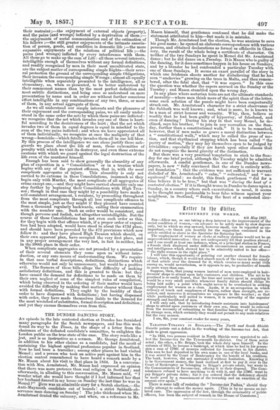THE DUNDEE DANCING STORY.
AN episode in the late contested election at Dundee has furnished many paragraphs for the Scotch newspapers, and has this week found its way to the Times, in the shape of a letter from the chairman of the defeated candidate's committee, to enlighten the 'London public on the true state of the case. The story reads like a jest, and is as instructive as a sermon. Mr. George Armitstead, in addition to his other claims as a candidate, had the merit of sustaining the highest spiritual professions popular in Scotland. Now he had been a traveller ; among other places he had visited Memel ; and a person who took an active part against him in the election contest remembered to have heard a remark made by a Mr. Mason about his visit to that place in 1854. In a conversation with Mrs. Armitatead, Mr. Mason had expressed an opinion that there was more pretence than real religion in Scotland ; and afterwards, in alluding to this conversation, Mr. Mason said, "I wonder what she would have thought if I had informed her that her husband danced in my house on Sunday the last time he was in Memel ?" tlere was an admirable story for a Seoteh eleetion,—the Auti-Maynooth candidate out of bounds ! a strict Sabbath-observance man dancing on Sunday ! The joke thickened when Mr. Armitstead denied the calumny, and when, on a reference to Mr.
Mason himself, that gentleman confessed that he did make the statement attributed to him—but made it in mistake.
Though Mr. Armitstead lost the election, he was anxious to save his good name ; he opened an elaborate correspondence with various persons, and obtained declarations as formal as affidavits in Chancery, the result of the whole being a certificate of character. On neither of the two Sundays he spent in Memel did Mr. Armitstead dance ; but he did dance on a Tuesday. It is Mason who is guilty of the dancing, for it does sometimes happen in his house on Sundays, and by a blunder he had confounded a particular Tuesday with one of those Sundays. It seems an exact parallel of the story in which one Irishman shoots another for disbelieving that he had seen " anchovies " growing on the trees in Malta, and then remembered, after the fatal shot, that "it was capers." In this ease the question was whether the capers accrued on the Sunday or the Tuesday; and Mason stumbled upon the wrong day. In any place where sectarian tests are not the ultimate standards of morality—where men think more of the spirit than of the letter, some such solution of the puzzle might have been conjecturally struck out. Mr. Armitstead 's character for a strict observance of the Sabbath was well known ; and, what is more, he is known to be a man of strict honour and veracity. Why, then believe so readily that he had been guilty of hypocrisy, of falsehood, and even of dancing? During his stay in that very Memel, he declined, says his brother, "to join in any recreation on the Sunday, further than a constitutional walk." It is to be remarked, however, that if men make so grave a moral distinction between a "constitutional walk," which may be called the prose of motion, and that rhythmical stepping which has been called "the poetry of motion," they may lay themselves open to be judged by trivialities; especially if they are harsh upon other classes that do not recognize the moral gravity of the distinction. But there was a very practical temptation to stick to the Sunday for one brief period, although the Tuesday might be admitted afterwards. A candid gentleman, in one of the Dundee newspapers, is now "fully convinced that the story is entirely without foundation " ; that the evidence was not sufficient to warrant disbelief of Mr. Armitstead's " calm," " reiterated," and " unequivocal" denial : no doubt, this frank gentleman "did for a time believe it to be true," but that was "during the heat of a contested election." If it is thought worse in Dundee to dance upon a Sunday, in a country where such exereitation is usual, it seems to ho thought more pardonable to boar false witness against your neighbour, in Scotland, "during the heat of a contested election."


























 Previous page
Previous page